Books
Books
in random order

Clarifications
Hourja Bouteldja, Alain Brossat
Alain Brossat est ex-militant de la LCR ancré dans une lecture anti-impérialiste de la politique. Houria Bouteldja est la cofondatrice du QG Décolonial et une figure de l'antiracisme politique. Dans cet entretien exigeant, les deux penseur·ses et militant·es clarifient leurs divergences et leurs convergences autour de la religion, du racisme, de l'État, du fascisme et de l'impérialisme. Alors que ces questions clivent celles et ceux qui luttent pour l'émancipation, rendant parfois les discussions impossibles, les deux auteur·ices reviennent sur leurs parcours politiques et philosophiques, sans pour autant feindre le consensus de leurs héritages politiques. Entretien coordonné par Marianne VL Koplewicz.

The TV Sutras
Inspired by visionaries like Moses, William Blake, and Joseph Smith, Bellamy spent five months in 2009 receiving transmissions from her television set and writing brief commentaries on each. The sutras and commentaries in the present volume are the beginning of an intensive investigation into the nature of religious experience. What are cults? Are they limited to wacko marginal communities, or do we enter one every time we go to work or step into a polling place? What is charisma and why are we addicted to it? Bellamy speaks candidly and intimately to her own experience as a woman, a writer, and former cult member. This commingling of memoir, fiction, collage and essay makes room for horny gurus, visitors from outer space, the tenderness of group life, and maybe the beginnings of a hard-won individualism.

The queen's ball
The Queen’s Ball ingests taboo as fuel for a baroque and spiraling story of love in its most prismatic and absurd iterations. Through frightening distortions and hallucinogenic twists of fate, a demented circus of artists, writers, gender-hustling aesthetes, and religious fanatics collude in a glorious discombobulation of propriety and convention. I have never laughed this much at a novel that could somehow shock even the most irreverent of libertines, demanding, at times, absolute disgust. Truly nasty work. Iconic. —Juliana Huxtable
Translated by Kit Schluter
Afterword and notes by Thibaud Croisy, translated by Olivia Baes
Set among the flamboyant demi-monde of the 1970s Paris underground, The Queens’ Ball follows the narrator Copi in his attempt to write a novel as life comes undone around him. His Roman lover Pietro is stolen by a Marilyn Monroe impersonator whose coterie take up residence in Copi’s flat and pump out low-budget pornographic rags and films. His friends leave him, burnt out from the theatrical excess of the decade. And worst of all his editor keeps calling him, demanding to know where the book is. Propelled by Copi’s careening prose and incisive humor, The Queens’ Ball swerves from Paris to Ibiza to New York and back again in a whirlwind frenzy of love, loss, and madness. Featuring an illuminating critical appendix by Copi’s current French editor, Thibaud Croisy, Kit Schluter’s rhapsodic translation marks the début of Copi’s world-renowned fiction in English.
The Queen’s Ball is a heedless novel of transformation of bodies and tenses, a novel of enormity and loss which is, in the end, about writing a novel. Copi is a feckless romantic-his theme is the persistence of love in the phantasmagoria. His tender psychos hurtle through increasingly outré adventures that seem to expand and contract like accordions. Here is crime à la française. Here is a great queen’s verbal aggression, radiant detail, and joyous destructive energy. —Robert Glück
The Queens’ Ball is probably Copi’s masterpiece... By 1978, Copi was already an aesthetic: The Queens’ Ball was the magnet, the inverted whirlpool that brought that aesthetic to the surface. —César Aira
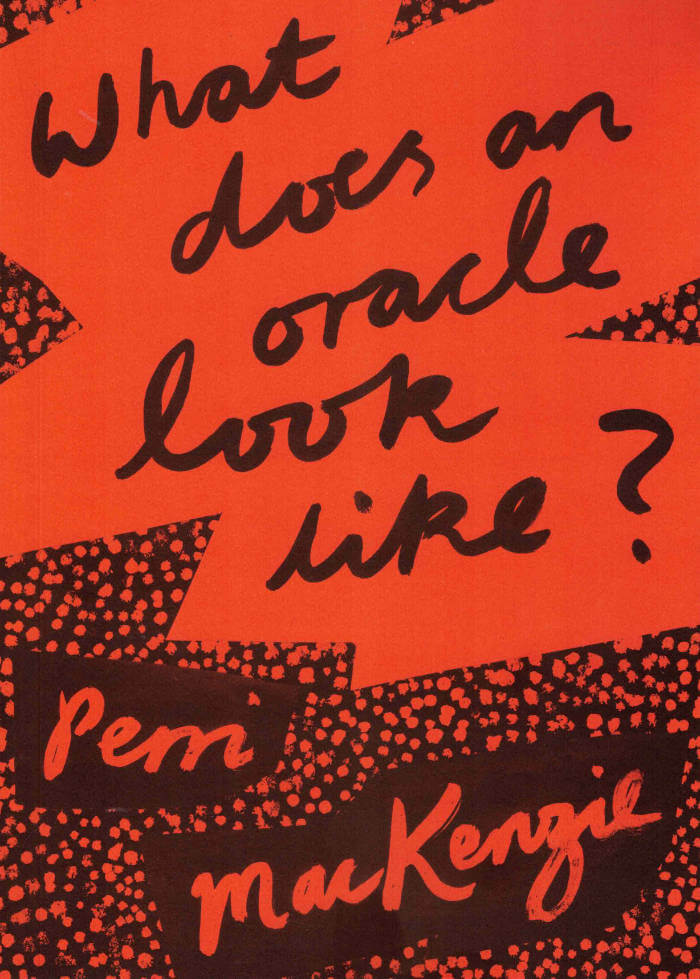
What does an oracle look like?
What does an oracle look like? gathers essays and drawings made by Perri MacKenzie between 2020 and 2024, themed loosely around pottery painting and vocal expression. The drawings, rendered in splashy India ink and collage, range from expressive sketches to theatrical still lives and experimental bandes dessinées. The book presents for the first time the essay Cathedral. Part memoir, part literary/sonic investigation, it meditates on the vocal texture of a Hollywood actor.
Designed by Ilke Gers.

#6 Schizm Magazine
ACCESS/EXCESS (coercion, proliferation & mutation)
Contributions by Bob Ajar, Maziar Afrassiabi, Sam Basu, Matt Calderwood, John Chilver, Rhys Coren, Patrick Coyle, Arnaud Desjardin, Catherine Hughes, Thomas Lock, Paul McDevitt, Sean Parfitt, Cornelius Quabeck, Chico Stockwell and Katarina Zdjelar.
Schizm Magazine invites contemporary artists and writers to contribute pages in response to a theme which, as the title implies, engages with a paradoxical idea. Each issue combines archival material with original works and texts sent in by between ten to thirty contributors.

DWOSKINO. The Gaze of Stephen Dwoskin
Henry K Miller, Rachel Garfield
DWOSKINO. The Gaze of Stephen Dwoskin is the culmination of a three year research project, The Legacies of Stephen Dwoskin, at the University of Reading where his archive is housed. The book is a unique visual distillation of Dwoskin’s life and times, with hundreds of never-seen-before images taken from his archive, and texts by among others Laura Mulvey, Raymond Bellour, Raymond Durgnat, and Dwoskin himself.
Stephen Dwoskin (1939–2012) began his filmmaking career in the New York underground scene of the early 1960s, then moved to London in 1964, where he became a leading figure in avant-garde film, and was one of the founders of the London Filmmakers Co-operative (now LUX). His early works, such as Dyn Amo (1972), are synonymous with the male gaze. Laura Mulvey wrote that he ‘opened a completely new perspective for me on cinematic voyeurism’ and his work was a major influence on her influential work on the male gaze in cinema. From the mid-1970s, he focused his camera upon his own body, afflicted by polio during childhood, in such films as Behindert (1974) and Outside In (1981).

Archive Dora Diamant #05
A collection of photographs from the archives of the icon of underground and alternative Parisian nights Dora Diamant.
A self-taught photographer, Dora Diamant has left thousands of photos. The Dora Diamant Association, custodian of this archive, and Éditions L'Amazone have joined forces to bring them to life by devoting a series of publications to them. Each volume of the Dora Diamant Archive was created by a different person and is the result of a subjective selection and arrangement specific to its author.
Figurehead of the Parisian underground and queer nights, photographer, DJ, multimedia and polymorphic artist, Dora Diamant was the daughter of Pascal Doury.
Selected by Clara Pacotte and Esmé Planchon.

This Is Not My Signature
A journey through the artist's work and life.
William Anastasi is the author of a prolific body of work. A major figure in conceptualism and in many respects one of its initiators, his trajectory cannot be solely confined to this chapter in the history of contemporary art. The book revisits, through the prism of multiple voices, the various aspects of an approach that unfolded with the use of complementary mediums. Drawing coexists with photography and "new" technologies, alongside objects, paintings, and installations. Within this corpus to be (re)discovered, sounds, images, and language, as well as artifacts, protocols, and processes, convey inquiries related to space and time, representation, and perception. With contributions from Dove Bradshaw, Chiara Costa, Béatrice Gross, Valérie Mavridorakis, Hélène Meisel, Sébastien Pluot, Julia Robinson, Robert Storr, and Erik Verhagen.
Edited by Erik Verhagen.
Texts by Dove Bradshaw, Chiara Costa, Béatrice Gross, Valérie Mavridorakis, Hélène Meisel, Sébastien Pluot, Julia Robinson, Robert Storr, Erik Verhagen.
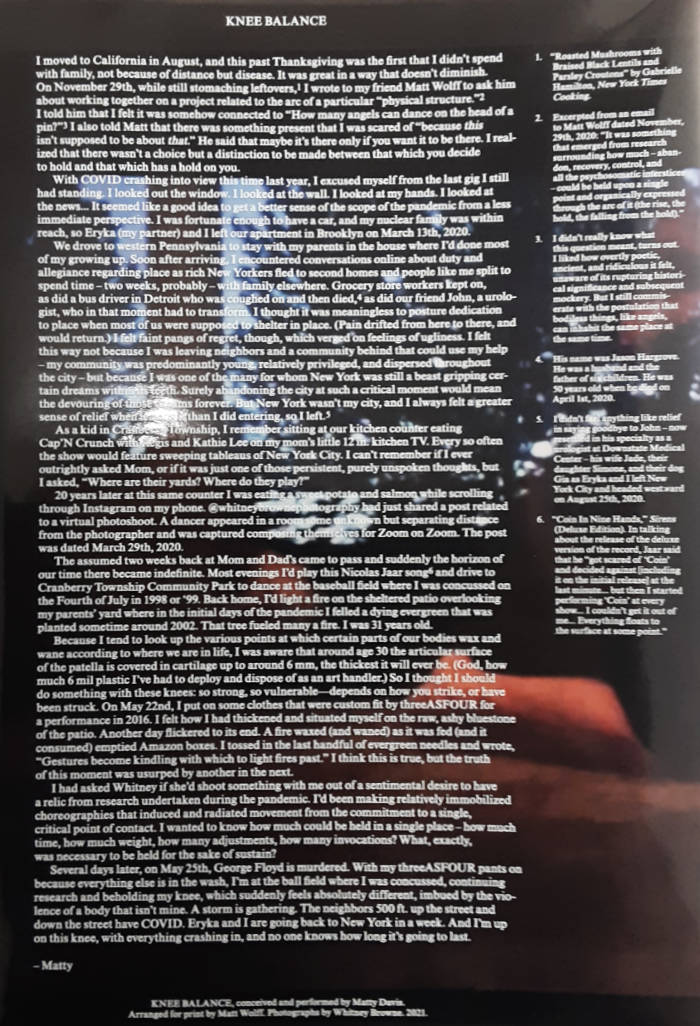
Knee Balance
KNEE BALANCE (2021) is a performance that uses choreography, writing, photography, and design to traverse particular anatomical, personal, and sociopolitical arcs. Time oscillates and fractures movement. Space unfolds. Situated before a hearth in the throes of balance, the performer becomes a crucible for memory, durability, and the reciprocal relationship between the present and the unforeseen.
Comes nested inside ad hoc polyvinyl sleeve with text by Matty Davis printed on front
This work marks the first in a series of performances by Matty Davis arranged for print by Matt Wolff. Distinct in content and form, each work weaves psychosomatic realities with the spatial and temporal possibilities of print.
Vital contributions have been made to this series of performances by artists including Will Arbery, Whitney Browne, Mark Davis, Eryka Dellenbach, Nile Harris, Jonah Rosenberg, Holly Sass, Matt Shalzi, and Bobbi Jene Smith.

an A to Z of Indexing / Organising / Cataloguing BFTK for Two Voices + a Triumvirate Announcement for Editions A, B, C
The reading score for the presentation at rile*books on Sunday June 23, an A to Z of Indexing / Organising / Cataloguing BFTK for Two Voices.

Let's Not Get Used to This Place – Works 2008-2023
Edited by Astrid Kaminski, Jeroen Versteele, Julie De Meester. A personal and intimate look behind the scenes of Meg Stuart's creative process over more than a decade.
Since the early nineties, Meg Stuart, and her dance company Damaged Goods, based in Brussels, have produced a remarkable and audacious body of choreographic work. In 2010, Damaged Goods published Are we here yet?, which spans the first twenty years of Meg Stuart's career. In the follow-up book Let's not get used to this place, the choreographer looks back on more than a decade of works through reflections, interviews, scores, and notes on the practice of creating, performing, teaching and living dance. These are mixed with reports, essays and poetry by collaborators and other observers, photos, performance texts and archive material. The book's title, gleaned from one of Stuart's recent video works, ties together these multifarious sources in a desire to discard tried and tested strategies, explore new contexts, and transgress the edge of what we (do not) know.
Let's not get used to this place gives a sense of the plentitude of motions, inspirations and personalities that energize Meg Stuart's creative cosmos. It offers a personal and intimate look behind the scenes of the creative process, and expands this to include the world around it. As a journey through her more recent career, an inspiring manual and a work of art in its own right, it has a wide appeal to an international base of artists, students and peers, and to anyone who is interested in performance.
Contributions by Jean-Marc Adolphe, Preethi Athreya, Mariana Tengner Barros, Sandra Blatterer, Esther Boldt, Márcio Kerber Canabarro, Varinia Canto Vila, Descha Daemgen, Jorge De Hoyos, Igor Dobricic, Brendan Dougherty, Doris Dziersk, Tim Etchells, Moriah Evans, Thomas F. DeFrantz, Jule Flierl, Alain Franco, Davis Freeman, Ami Garmon, Philipp Gehmacher, Jared Gradinger, Ezra Green, Claudia Hill, Maija Hirvanen, Elise Misao Hunchuck, Astrid Kaminski, Kiraṇ Kumār, Göksu Kunak, André Lepecki & Eleonora Fabiano, Jean-Paul Lespagnard, Marc Lohr, Matthias Mohr, Anne-Françoise Moyson, Anja Müller, Kotomi Nishiwaki, Jeroen Peeters, Alejandro Penagos, Léa Poiré, Leyla Postalcıoğlu, Ana Rocha, Tian Rotteveel, Hahn Rowe, Isabela Fernandes Santana, Maria F. Scaroni, Bernd M. Scherer, Kerstin Schroth, Gerald Siegmund, Charlotte Simon, Mieko Suzuki, Claire Vivianne Sobottke, Poorna Swami, Meg Stuart, Margarita Tsomou, Kristof Van Boven, Elke Van Campenhout, Myriam Van Imschoot, Jeroen Versteele, Doug Weiss, Stefanie Wenner, Jozef Wouters, John Zwaenepoel.
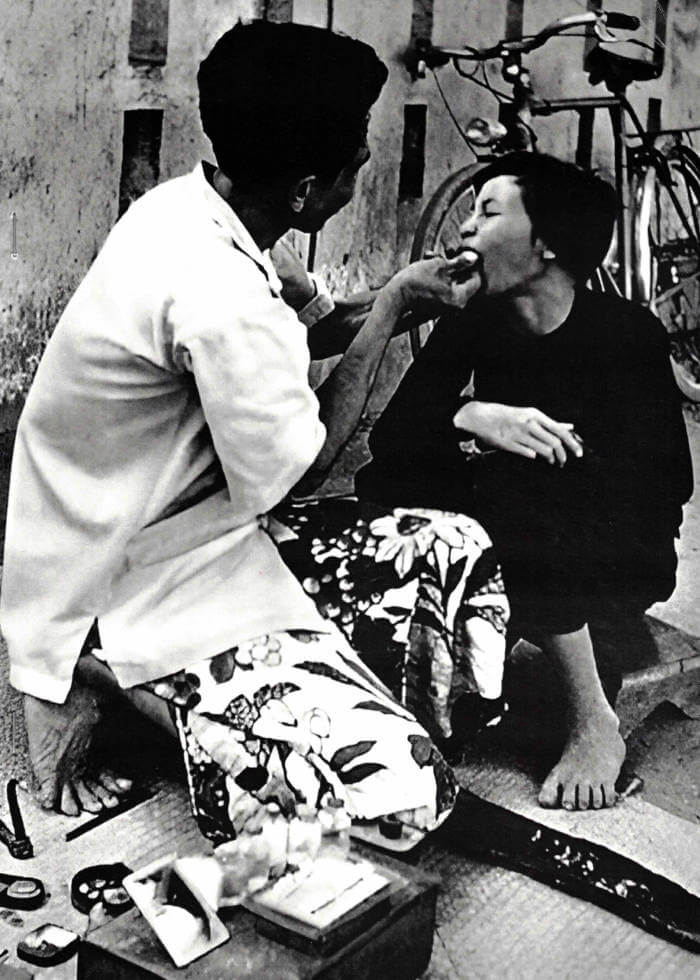
Teeth Surrounding a Flower in the Meanings
In ‘Teeth Surrounding a Flower in the Meanings’ a compilation of texts from the critical discourse surrounding his work, written by various authors between 2016 and 2023, serves as source material for a series of erasures.
Through retro- and introspectively reading into the works and the practice at large from poetic angles, these poems investigate the relation between art and its discourse, the words used, and their edges.

Eecchhooeess
American poet Norman H. Pritchard's second and final book, EECCHHOOEESS was originally published in 1971 by New York University Press. Pritchard's writing is visually and typographically unconventional. His methodical arrangements of letters and words disrupt optical flows and lexical cohesion, modulating the speeds of reading and looking by splitting, spacing and splicing linguistic objects. His manipulation of text and codex resembles that of concrete poetry and conceptual writing, traditions from which literary history has mostly excluded him. Pritchard also worked with sound, and his dynamic readings—documented, among few other places, on the album New Jazz Poets (Folkways Records, 1967)—make themselves heard on the page.
EECCHHOOEESS exemplifies Pritchard's formal and conceptual sensibilities, and provides an entryway into the work of a poet whose scant writings have only recently achieved wider recognition. DABA's publication of EECCHHOOEESS is unabridged and closely reproduces the design of the original 1971 volume.
Norman H. Pritchard (1939-96) was affiliated with the Umbra group, a predecessor to the Black Arts Movement. He taught writing at the New School for Social Research and published two books: The Matrix: Poems 1960-1970 (Doubleday, 1970) and EECCHHOOEESS (New York University Press, 1971). His work was anthologized in publications including The New Black Poetry (1969), In a Time of Revolution: Poems from Our Third World (1969), Dices or Black Bones: Black Voices of the Seventies (1970), Ishmael Reed's 19 Necromancers from Now (1970), Text-Sound Texts (1980) and others.
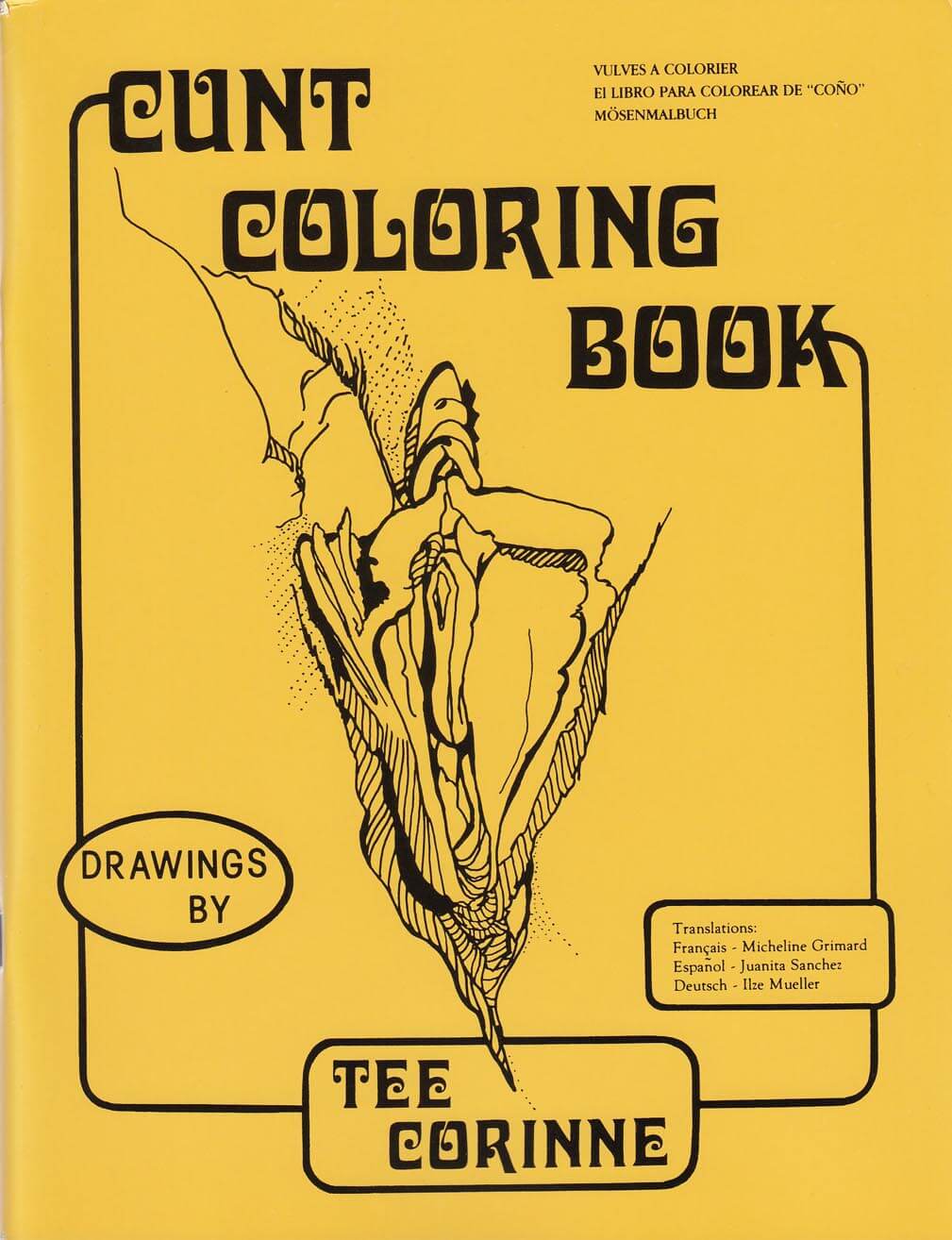
Cunt Coloring Book
Over three dozen c**ts of every size and description for you to color. Originally used for a sex-education class. Crayons not included. First published in 1975 by lesbian activist and artist Tee Corinne.
"In 1973 I set out to do drawings of women’s genitals for use in sex education groups. I wanted the drawings to be lovely and informative, to give pleasure and affirmation. I organized the drawings into a coloring book because a major way we learn to understand the world, as children, is by coloring. As adults many of us still need to learn about our external sexual anatomy." —Tee Corinne
Tee Corinne was born November 3rd, 1943 and grew up in St. Petersburg, Florida. Her mother, also an artist, introduced her to the creative principles and techniques that would serve her all her life. She received a B.A. in printmaking and painting from the University of South Florida, then went on to get an M.F.A. in drawing and sculpture at Pratt Institute, graduating in 1968. Afterwards she taught for many years, traveled through Europe, and finally became enmeshed in the back-to-the-land movement and communal living. After nearly ten years of marriage to a man she referred to as her "best friend," Corinne came out of the closet amidst severe depression in 1975. The strength to accomplish this difficult effort would later propel her to heights and achievements that would distinguish her as "one of the most visible and accessible lesbian artists in the world." From the mid-1960’s to the day she died Corinne created, published, and exhibited her art and writing around the world. She was a co-facilitator of the Feminist Photography Ovulars and a co-founder of The Blatant Image, A Magazine of Feminist Photography. She was the author of one novel, three collections of short stories, four books of poetry and numerous arts publications. In 1980, she was one of ten selected artists invited to have their work exhibited in the Great American Lesbian Art Show. The world lost Tee Corinne to cancer in 2006.
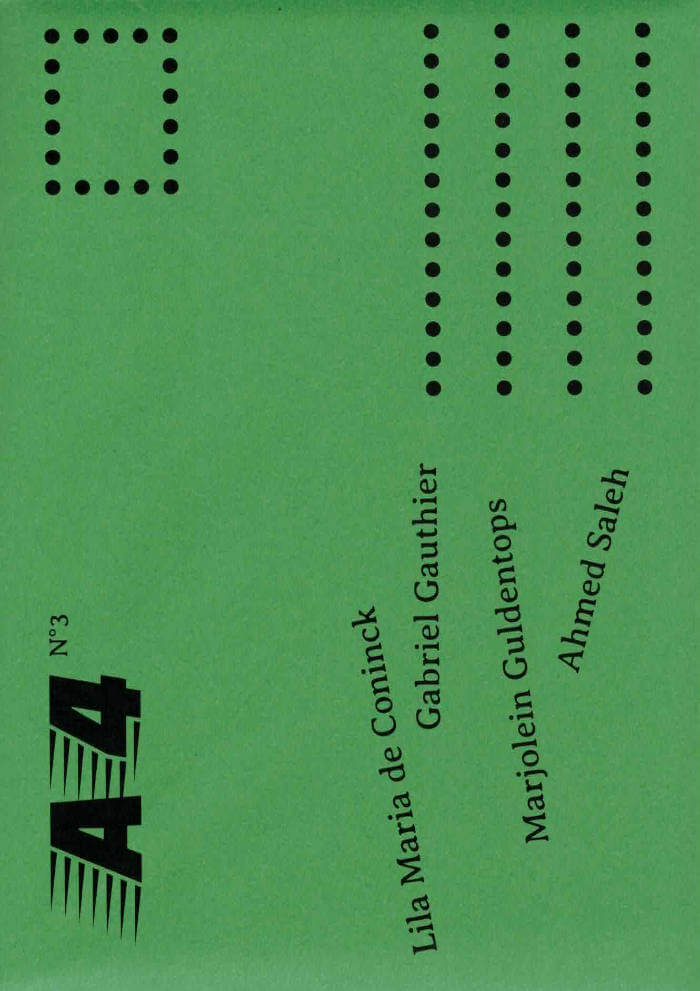
A4 review N°3
Marjolein Guldentops, Ahmed Saleh and 2 more
Founded in 2023, A4 is a poetry review which showcases and explores contemporary writings practices. Run by Littérature Supersport collective, the object is seen as the extension of their events. The review takes the form of 4 postcards which, when placed side-by-side, form an A4-sheet. A light (even precarious) format for literature that slips into the back pocket of pants and hangs on fridge doors. Each issue features unpublished texts by 4 authors. Wrapped in colors, A4 is distributed by post and available in good bookshops, in Brussels, Liège, Paris and Marseille.
This third issue presents texts by : Lila Maria de Coninck, Gabriel Gauthier, Marjolein Guldentops & Ahmed Saleh.
Ahmed Saleh (born 1998) is a Palestinian writer and poet from Gaza. He studied business administration and political science and is currently living in Brussels. Ahmed writes articles in Arabic and English, several of which have been published on various platforms.
Marjolein Guldentops (Belgium, 1994) is a visual artist, author, and performer. Her artistic practice spans various mediums, including text, video and performance. Rooted in the concept of worlding, her work explores the urban rhythms, flows, and semantics that shape perceptions of space and language in both physical and metaphysical senses.
Gabriel Gauthier is a graduate of the Beaux-arts in Paris. He writes books, performs and makes music. He has published Simurgh & Simorgh and Contra at Théâtre Typographique (2016, 2024) and Speed at Vies Parallèles (2020). He has designed pieces at the border of dance and visual arts (Cover, Rien que pour vos yeux). Space, his first novel, was published by Corti.
Lila Maria de Coninck (2004) is a Belgian creator living in The Hague. She makes music, theatre and writes poetry. The guiding principle in her works is the use of multilingualism and miscommunication to promote creativity in her mother tongue, Dutch.
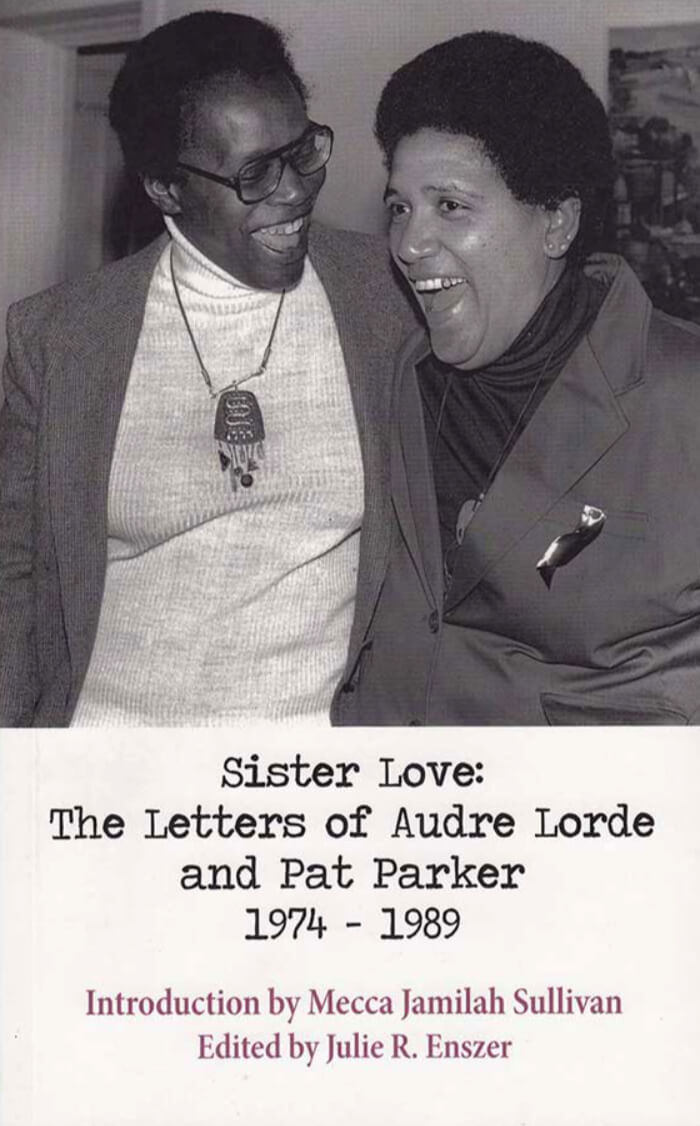
Sister Love: The Letters of Audre Lorde and Pat Parker 1974-1989
Poets Audre Lorde and Pat Parker first met in 1969; they began exchanging letters regularly five years later. Over the next fifteen years, Lorde and Parker shared ideas, advice, and confidences through the mail. They sent each other handwritten and typewritten letters and postcards often with inserted items including articles, money, and video tapes.
Sister Love: The Letters of Audre Lorde and Pat Parker 1974-1989 gathers this correspondence for readers to eavesdrop on Lorde and Parker. They discuss their work as writers as well as intimate details of their lives, including periods when each lived with cancer. Sister Love is a rare opportunity to glimpse inside the minds and friendship of two great twentieth century poets.

An Anarchist Playbook. Radical Translation Workshop
Sanja Perovic, Rosa Mucignat and 2 more
The Conspiracy of Equals (1796) is often hailed as the first revolution against a revolutionary state. Even if the conspirators were soon found out and put on trial, their ideas of radical equality and liberty shaped future generations of revolutionaries worldwide. An Anarchist Playbook—the first publication in Tenement’s new imprint, No University Press—gathers together many of the key documents from their trial across a myriad forms, with a number of these texts appearing herein in their first English-language translation.
Assembled in the Playbook are the last words of Gracchus Babeuf, the leader of the conspiracy and a radical proponent of the abolition of private property, and of his fellow conspirator Augustin Darthé, as they faced the guillotine. We’ve a letter, written in the popular idiom of the sans-culottes, that urges the common soldier to rebel; the score and lyrics of a street song that names the new class enemy: the wealthy bourgeoisie who have profited from the revolution; a first-time English translation of ‘The Last Judgement of All Kings’—an extraordinary one-act play by Sylvain Maréchal, the unofficial poet of the Conspiracy, that was performed to considerable acclaim in Year II of the Revolution (and that the Workshop is in the process of adapting for contemporary audiences).
Many of these texts were never published in their own time, and form a part of the testament left behind by Philippe Buonarroti, a leading conspirator who inspired new generations of revolutionaries across Europe over the course of the nineteenth and early twentieth centuries. Among the best known works included is the Manifesto of Equals, long considered a founding text of social, communist and anarchist revolutions. The Playbook presents a translation of the Manifesto alongside other key texts by the conspirators, reconstructing the richness and variety of revolutionary communication that informs the editorship, shape, and scope of this volume.

Les arbres la nuit
Rosanna Puyol Boralevi, Pablo Réol
An artist's book for children, with text by Rosanna Puyol Boralevi and drawings by Pablo Réol, printed in risography.
New edition of the book published in a limited edition of 50 copies in 2024.
Rosanna Puyol Boralevi is a French poet, translator and editor. Co-founder of Brook editions, she publishes translations of texts inspired by feminist and anti-racist struggles, a literature that is both poetic and analytical. She collaborates with artists on exhibitions, video and performance programs, and organizes reading groups, writing and translation workshops, often with friends.
Pablo Réol (born 1989 in Bordeaux) is a French artist.

Death Book ll
Death Book is dedicated to Bruce LaBruce’s archive of rarely published or previously unpublished work characterized by morbid fascinations. Here photographs challenge the viewer to explore what lies beneath the veneer of Western society.
The book brings this body of work together for the first time, combining LaBruce’s performances, actions, film production stills and photography that explicitly outline his obsessions, with never-before exhibited archival works from projects including Hustler White, Otto; or Up with Dead People, and L.A. Zombie.
The book is edited as loosely connected vignettes, characterised by horror, the carnage accelerated rather than overcome, questioning existing values, hierarchies, and perceptions of good and evil. A variety of faces and body parts appear, including those of actors Francois Sagat and Tiger Tyson, model/actor Tony Ward, artists Kembra Pfahler and Slava Mogutin, and cameos by legendary figures such as performance artist Ron Athey, musician/artists Genesis P-Orridge and Lady Jaye, artist Dash Snow, actor Brad Renfro, Asia Argento and Bruce LaBruce himself.
The Death Book also introduces the art director Max Siedentopf, who has designed the book as a paraphrase of the Bible, punctured with three bullet holes, piercing the book from front to back. The book contains an introduction by artist, photographer and writer Slava Mogutin.

Euforia
This monograph explores the work and the artistic activities of Italian radical performer, poet, visual artist and feminist Tomaso Binga through a specific lexicon (Agora, Biographies, the Corporeal Nature of the Word, Correspondences, Geographies, Vaginal Value), and also features a selection of poems by the artist.
The volume explores the key passages of Tomaso Binga's artistic practice, and as such is divided into three macro areas. The first, purely textual, following institutional introduction by the President of the Fondazione Donnaregina per le arti contemporanee Angela Tecce, features texts by Eva Fabbris, Daria Khan, Quinn Latimer, Lilou Vidal, and Stefania Zuliani, as well as a conversation between the artist herself and Luca Lo Pinto. The second part brings together a series of short critical texts that offer an in-depth analysis of single works and small bodies of work by Tomaso Binga. These contents are further subdivided into six categories (Agora, Biographies, The Body of the Word, Correspondences, Geographies, Vaginal Value) with the aim of delving into the key areas of interest in Tomaso Binga's practice in chronological order. Critical contributions are thus provided by Marc Bembekoff, Barbara Casavecchia, Martina Cavalli, Chiara Costa, Anna Cuomo, Valérie Da Costa, Allison Grimaldi Donahue, Daria Khan, Émilie Notéris, Raffaella Perna, Antonello Tolve, and Andrea Viliani. The third and final part is dedicated to the artist's visual poems. Each poem is accompanied by an English translation, in several cases published here for the first time.
Embedded in the language of visual and sound poetry, the practice of Tomaso Binga (Bianca Pucciarelli Menna, born 1931 in Salerno) is based on an ironic, insightful questioning of the idea of gender. In her work, this theme is not only a generator of identity, but also a way of looking afresh at the social roles, rights and opportunities traditionally available to women. Her decision to work under a male pseudonym from 1971 onwards was intended to parody male privilege and to provoke a barbed reflection on the political dimension of what it is to be a woman. Her attitude has served as a key marker within the gender equality issues at the center of the debate raging amongst the younger generations.
Edited by Eva Fabbris, Lilou Vidal, Stefania Zuliani with Anna Cuomo.
Texts by Tomaso Binga, Eva Fabbris, Daria Khan, Quinn Latimer, Luca Lo Pinto, Lilou Vidal, Stefania Zuliani.

Rīgas cirks Riga Circus
A kaleidoscopic peek into the traditional circus of Riga.
The circus is a drama that extends its own means, and the metaphor of its name (itself clowning around with the word) is widespread across the art industry, financial world, and, of course, anything to do with performance. For four years during the mid-aughts, Ieva Epnere immersed herself in the life of the Riga Circus—a type of traditional circus that cherishes the respectful use of animals, operating on a circus-family model (skills are passed down through generations to produce family units that travel and live on the road), and the big top tent (the landmark interior of one of the oldest circus structures, built for this purpose in Europe since 1888) as a performance space.
This publication, that was developed during Ieva Epnere's fellowship with the Artists-in-Berlin Program of the DAAD, symbolically marks four stages of her single, larger work. Fine-tuned digital color shots, a collection of black-and-white 35 mm film prints showing action at the Riga Circus, followed by a burst of color shots and black and white photos taken on a film camera, to end with a set of intimate black-and-white portraits of the performers. Whereas the conversion of circus into text might to some degree be a violation of the true nature of its subject, Ieva Epnere's book—with the help of elephants, clowns, all the "freakery," and her kaleidoscopic peek into the machinery that makes performances in the arena possible – itself stands as an adventurous act of reinvention.

Suckcess Magazine 1 — Winter 2021-22
Drama, careers, sabotage, compromises... The first issue of Suckcess Magazine begins with a selection of poems by the flamboyant Rene Ricard, edited with the help of Editions Lutanie, and continues with contributions from Miriam Laura Leonardi, Fabienne Audéoud, Camille Aleña, Gabi Losoncy, David Lieske, Sylvie Fanchon, Won Jin Choi, Estelle Hoy, and Bunny Rogers. Cartoons and tennis players are also on the program.
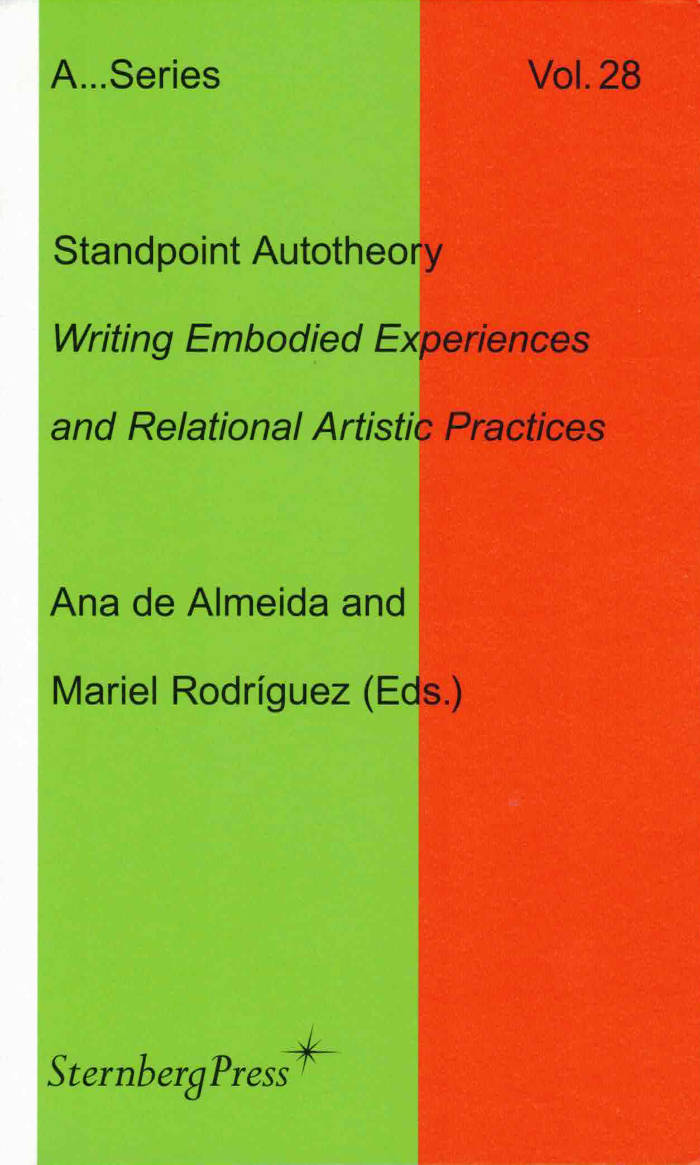
Standpoint Autotheory – Writing Embodied Experiences and Relational Artistic Practices
Ana de Almeida, Mariel Rodríguez
In this anthology of essays, twelve artists explore radically self-reflexive research attitudes integrating embodied experiences within the production of theory.
Standpoint Autotheory encompasses a multitude of manifestations of radically self-reflexive research attitudes. It traces research based artistic practices through twelve contributions that propose a performative integration of the personal within the production of theory and explore the entanglements of subjectivity with criticality aimed at social transformation by questioning dominant epistemologies.
The positions assembled in the book are permeated by different modes of thinking and practice such as autoethnography, practices of the self, auto-historia teoría, standpoint theories, strong objectivity and situated knowledge, self-authority, narrativity and storytelling, radical positioning, performative philosophy, autofiction, thinking-feeling, and other methods that, through the interrogation of embodied experiences, illuminate the connections between the personal and the political, as well as the individual and the communal.
Edited by Ana de Almeida and Mariel Rodríguez.
Contributions by Ana de Almeida, andrea ancira, Cana Bilir-Meier, Nina Hoechtl, Olena Khoroshylova, Sanja Lasić, Mai Ling, Stephanie Misa, Lena Ditte Nissen, Mariel Rodríguez, Ruth Sonderegger, Elif Süsler-Rohringer, Verena Melgarejo Weinandt.

Brick by Brick: How We Build a World Without Prisons
The fight for prison abolition is a struggle for collective liberation: a transformative vision of a safer world, in which communities live free from exploitation on a thriving planet.
Drawing connections across social justice movements with a shared abolitionist ethic, this revolutionary book illuminates how harmful ideas of criminality and punishment can manifest in many ways beyond the prison industrial complex. This work is a collaboration with friends, mentors and giants fighting for housing justice, food justice, climate justice, migrant justice, justice for survivors of violence, and more.
With this insightful and generous book, now in its second edition, Cradle Community invites us to explore what it will take to dismantle structures of oppression, and to imagine the future we can rebuild together—brick by brick.
Cradle Community is a collective of organisers committed to radical education and building understanding of prison abolition and transformative justice. Brick by Brick is their first book.